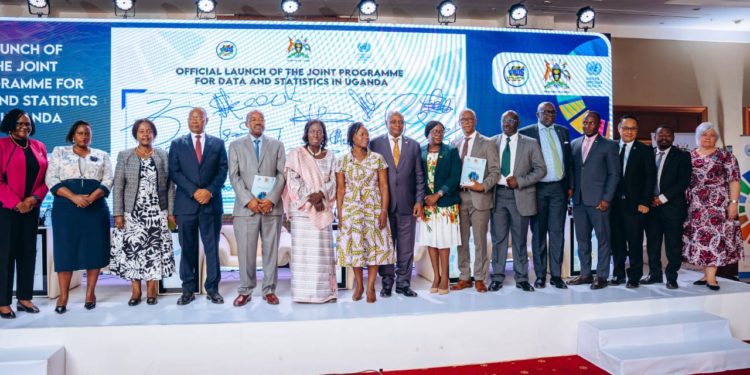By CHIMPREPORTS
By Happy Christine
The Government of Uganda and twelve United Nations entities, as part of the Joint Programme for Data and Statistics (JPDS), have launched a collaboration aimed at transforming the country’s data landscape. With a substantial investment of US$ 41,898,295, this initiative, led by the Uganda Bureau of Statistics (UBOS), is anticipated to reshape the nation’s statistical capabilities.
The JPDS, covering the period of Uganda’s third National Development Plan (NDP III) and the UN Sustainable Development Cooperation Framework (UNSDCF), is strategically designed to enhance the quality, relevance, and utilization of data aligned with the Sustainable Development Goals (SDGs). It serves as a crucial tool to bolster the National Statistical System’s capacity in data production, dissemination, and application.
During the official launch, First Deputy Prime Minister Rt. Hon. Rebecca Kadaga emphasized the critical role of statistics in effective resource management, stating, “We cannot wait longer to have the outcomes of this program to support us in managing the equitable allocation of resources and informing evidence-based policy and decision-making.”

In her detailed explanation, First Deputy Prime Minister Rt. Hon. Rebecca Kadaga emphasized the heightened awareness of the crucial role that statistics plays in the economy. She highlighted the substantial demand for statistical information, accompanied by elevated expectations, and stressed that the government greatly benefits from managing scarce resources when equipped with up-to-date statistical indicators. Urgency was underscored, emphasizing the immediate need for the program’s outcomes to facilitate the equitable allocation of resources and contribute to evidence-based policy and decision-making processes.
State Minister of Finance, Planning, and Economic Development Hon. Amos Lugolobi expressed confidence in the transformative impact of the Joint Programme for Data and Statistics. He commended the collaborative efforts involving various stakeholders, including government bodies, civil society organizations, the UN, and development partners.
Dr. Albert Byamugisha, Chairperson of the Board of Uganda Bureau Of Statistics (UBOS), emphasized the program’s potential to enhance the National Statistical System’s development, making the Uganda Bureau of Statistics’s mandate more achievable by bringing all stakeholders on board.

Dr. Chris Mukiza, the Executive Director of the Uganda Bureau of Statistics (UBOS), highlighted the crucial role of quality data in achieving Sustainable Development Goals (SDGs) targets. He pointed to efforts through the SDGs Data Technical Working Groups (TWG) to produce accurate statistics for effective reporting. Dr. Mukiza emphasized the reliance on quality statistics for the National Development Plan, citing its role in informing government performance and facilitating policy adjustments.
Expressing optimism about the Joint Programme on Data and Statistics, he underscored its potential to enhance ongoing efforts. He noted that Uganda monitors 121 out of 201 Sustainable Development Goals (SDGs) indicators, with a target of increasing this to 150 by 2024. Recognizing progress, he highlighted the program’s essential role in strengthening Uganda’s statistical capacity for monitoring international and national development frameworks across the National Statistical System (NSS).
Susan Namondo, UN Resident Coordinator in Uganda, celebrated the launch as a new approach to collaboration.

Twelve UN agencies, including UNDP, UN Women, UNICEF, UNFPA, WHO, UNCDF, ILO, FAO, UNEP, UNAIDS, IOM, and UNGP, have collaborated with the Uganda Bureau of Statistics (UBoS) to enhance support for Uganda’s data and statistics sector. The launch event, attended by representatives from various sectors, included the dissemination of findings from a comprehensive status review of data and statistics in Uganda. Technical experts emphasized the critical role of data in tracking and accelerating progress towards the Sustainable Development Goals (SDGs).
The panel discussion highlighted the necessity of consolidating existing partnerships and establishing new ones for the successful implementation of the Joint Programme for Data and Statistics in Uganda. The commitment from diverse partners reflects the significance of this joint program, poised to reshape Uganda’s data landscape and contribute significantly to achieving sustainable social and economic development. The ambitious investment and collaborative spirit showcased in the launch mark a milestone in Uganda’s journey towards data-driven progress and development.







Discussion about this post